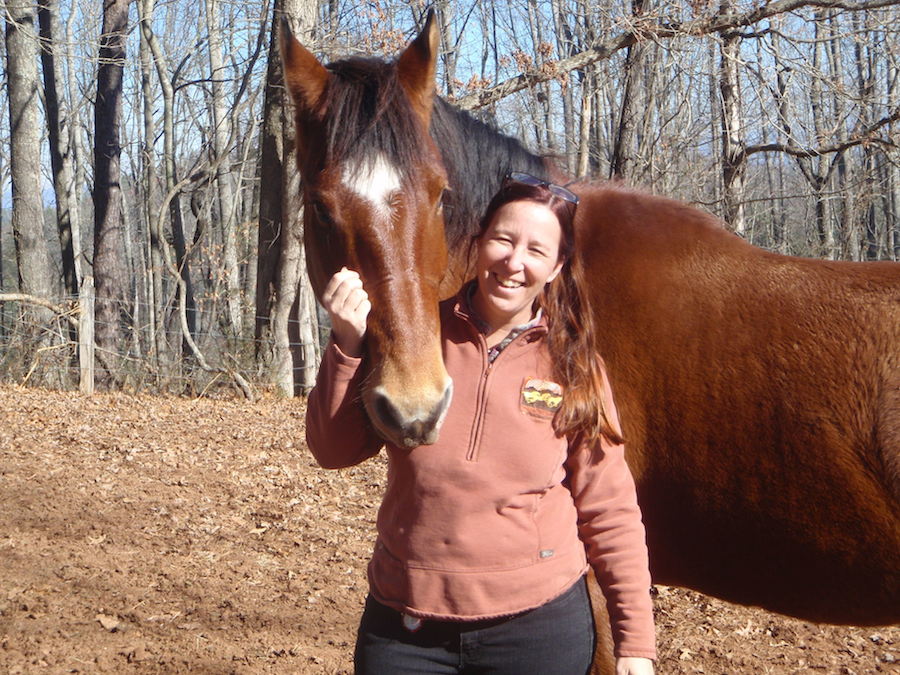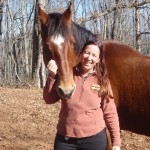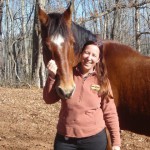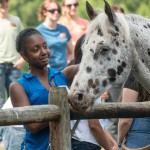- Shannon Knapp hugs a horse at the Horse Sense of the Carolinas farm in Marshall. Reve Shannon
“People think that a horse is useless if it can’t be ridden,” says equine specialist Shannon Knapp. “I find that patently false.” Knapp and her husband, Richard, a Parelli Natural Horsemanship instructor, bought their farmland in Marshall as a place to rescue and rehabilitate horses — many of which were deemed unridable. Now, the Knapps are proving just how useful horses can be. Having celebrated its 10th anniversary in 2013, Horse Sense of the Carolinas is an internationally recognized program and the leading resource for Equine Assisted Psychotherapy and Equine Assisted Learning (EAP/L) in Western North Carolina.
“I knew what I was looking for,” Knapp writes in her recently published book, More Than a Mirror: Horses, Humans and Therapeutic Practices, “a way to help people learn about themselves and incorporate horses in the process. I could pair unridable horses with people who didn’t necessarily need to ride them in order to learn from them.”
Since horses are prey animals, Knapp explains, they “have a highly developed sense of perception.” This skill makes them especially adept at reading and responding to clients in a therapeutic setting. “A horse can show you where you’re at,” says Knapp. Since many of the 28 horses at Horse Sense have survived challenging or abusive backgrounds, clients with similar experiences can see parallels within their own lives, according to Knapp.
Horse Sense's EAP/L evolved out of Natural Horsemanship, a methodology that focuses on partnering with horses, building rapport and establishing trust as opposed to using force when handling and training. Horse Sense draws extensively from Parelli Natural Horse Training and Natural Lifemanship Trauma Focused Equine Assisted Therapy (TF-EAP).
The approach is helpful in treating numerous conditions: depression, anxiety, grief, substance abuse, eating disorders, post-traumatic stress disorder, attention deficit hyperactivity disorder, autism and neuromotor issues, to name a few. Along with adults, children, families and couples, the staff at Horse Sense works with a range of special groups, including schoolchildren, at-risk youth centers, substance abuse treatment centers and veterans.
Curious to know how the process works, I venture into the horse arena with Knapp and therapist Rebecca Odom. This is typical of a session at Horse Sense, which includes an equine specialist who interprets the horse’s behavior and a mental health specialist who works therapeutically with the client. On the opposite side of the arena, three horses move around “at liberty.” Knapp explains that this freedom allows them to interact naturally as herd animals without feeling trapped.
At first, I observe the horses from a distance. Then, I walk into the arena and introduce myself to each horse, paying attention to their responses.
“What happened for you?” Knapp asks when I return.
“One of them walked away from me,” I say. “The other seemed mildly interested, and the third stood very motionless while I petted her. Overall they seemed slightly curious but not very engaged.”
“If they could talk amongst themselves,” asks Knapp, “what would they say about you?”
“They might say something like ‘She seems nice, safe, not very invasive,”’ I replied.
I might also interpret my self-description as unassertive in terms of developing relationships with the horses. Exploring ways to develop relationships is the purpose of the therapy. “If you’re good at building healthy relationships with a horse, you’ll be good a building healthy relationships with people,” says Knapp.
The third step in the process is practicing new behavior. “We each have an energy dial,” Knapp explains. “Some of us need to turn it up for effective communication. Others need to turn it down. We do this by applying different layers of pressure and seeing what works.”
Knapp demonstrates the different layers of pressure she uses to engage a horse, starting with simply staring at it from behind. When that doesn’t work, she rubs her fingers together to make a sound. Next she tries clapping. Then she tosses a handful of rubber gravel at the horse’s side. That gets the horse’s attention, and it turns toward her. At this point Knapp backs away to release the pressure, allowing the horse to come to her of its own volition. “The horse always has a choice,” says Knapp.
When it’s my turn, I apply the increasing degrees of pressure until the horse comes to me and allows me to pet her. She even nibbles gently on my fingers. Afterward, I reflect on my experiences with Knapp and Odom.
The three-part session I’ve completed is called the Relationship Logic TM practice of TF-EAP. Later on, I observe a group of women from Pavilion Drug and Alcohol Treatment Center, who are in the early stages of recovery, going through the same process.
“I wanted the horse to really like me,” says one client. “I just wanted to relate to the horse who came to me first,” says another. “It really takes being persistent,” a third adds. Afterward, the women reflect about how they need to be more assertive in their lives.
A group of youths from prison might have a different experience, likely realizing they need to be less aggressive in order to connect with the horses, according to Knapp. In every case, it’s about realizing that you have choices in how to act in relationships.
Knapp knows from personal experience just how valuable this work is. She attributes her own rehabilitation from a 17-year struggle with substance abuse largely to her connection with her horse. When Knapp sought treatment and joined a 12-step program, her relationship with her horse progressed along with her recovery.
“[My horse] didn’t trust me,” Knapp explains. “From the outside I was accomplished. I had credits after my name. But my horse didn’t give a hoot about any of it. … I wanted to become someone my horse could trust.”
Her journey inspired her to research horse therapy programs, which led her to discover the Equine Assisted Growth and Learning Associations (EAGA-LA ).
When I listen to Knapp address her Pavilion clients, I hear a true testimony of a woman who has turned addiction around, combined her recovery with a lifelong passion for horses and found a path to help others.
“When I wrote my bucket list in the beginning of my recovery, it had none of this.” Knapp sweeps her arm toward her barn, arena, rolling hills and horses. “Start small,” she tells them. “And dream big.”
To learn more about Horse Sense of the Carolinas, visit horsesenseotc.com. To volunteer or donate to the organization’s Youth and Veterans Scholarship Fund, email shannon@horsesenseotc.com.







This is quite the equestrian town. Thanks for the article!
There’s a big huge equestrian center going in at Tryon as well:
http://www.beverly-hanks.com/lifestyles/equestrian-horse-farms